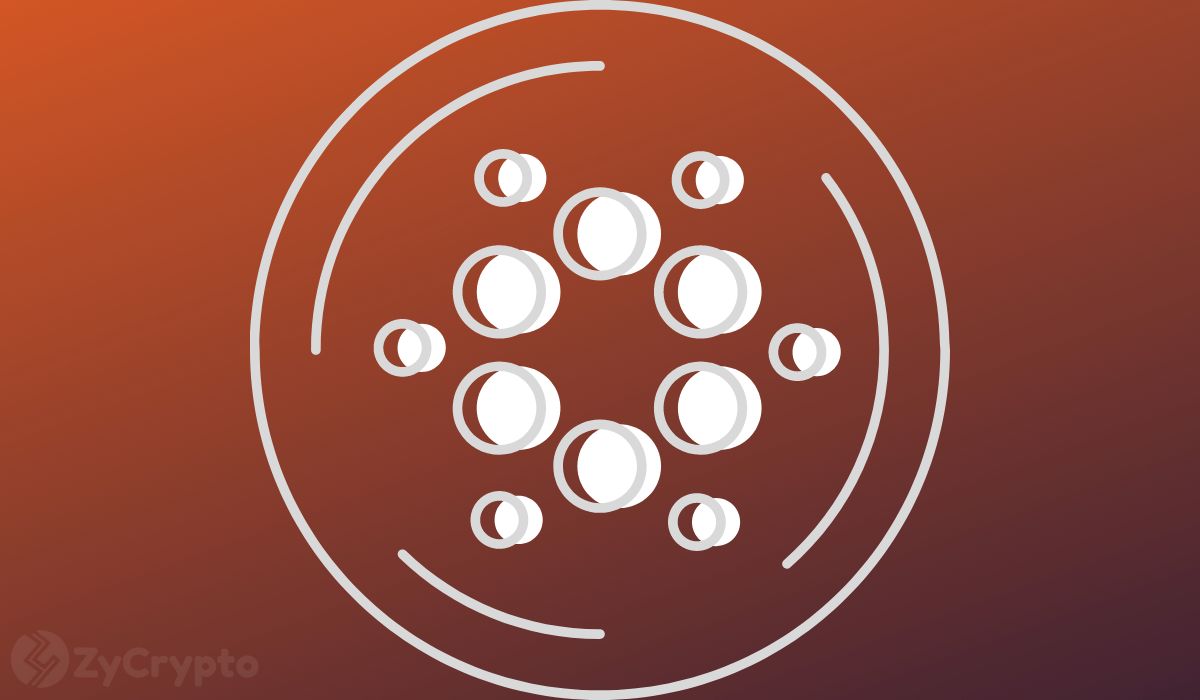The State of DeFi in Africa: Challenges and Growth Potential Ahead
Africa has become a global leader in mobile money and one of the fastest-growing regions for cryptocurrency adoption. From Kenya’s M-Pesa to Nigeria’s vibrant peer-to-peer crypto markets, the continent has...
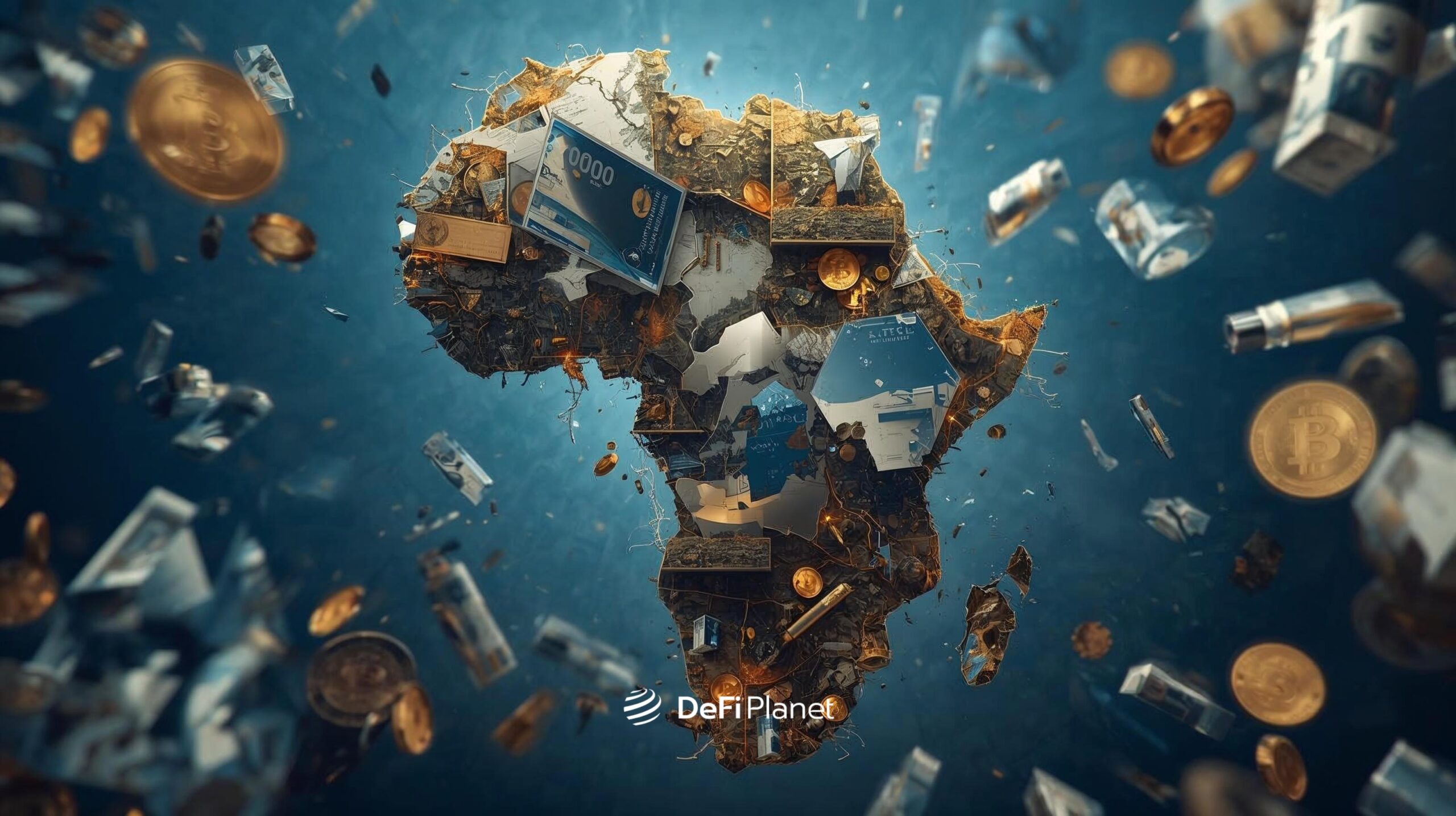
Africa has become a global leader in mobile money and one of the fastest-growing regions for cryptocurrency adoption. From Kenya’s M-Pesa to Nigeria’s vibrant peer-to-peer crypto markets, the continent has shown a strong grasp of the benefits of decentralised digital systems. Yet, when it comes to decentralized finance (DeFi), Africa still trails behind, held back by limited awareness, regulatory uncertainty, and infrastructural barriers.
Despite DeFi’s potential to unlock borderless lending, yield opportunities, and financial inclusion, its growth in Africa has been slow.
Let’s dig into the current role of DeFi in Africa and what it needs to succeed on the continent.
The Promise of DeFi for Africa
The problem of financial exclusion in Africa is deep and chronic; more than 350 million unbanked Africans live on the continent. Traditional banks often require documentation that many citizens don’t have, making even basic financial services out of reach. As a result, millions are left without access to savings, credit, or safe ways to transfer money.
The rise of mobile money systems like M-Pesa in Kenya shows that Africans are both willing and able to embrace digital finance. M-Pesa’s success in facilitating everyday financial transactions through mobile phones highlights the strong demand for simple, accessible financial services.
DeFi is continuing that momentum by giving us a new wave of financial services, which are decentralized, open to everyone, and programmable. DeFi in Africa would create alternatives to expensive remittance rates, inaccessible loans, and unreliable savings models.
As crypto adoption in Africa grows, some of the real-world applications already taking shape are peer-to-peer lending through blockchain platforms, yield farming, stablecoin savings to hedge against the volatility of currencies, and tokenization of assets into manageable and fractionalized portions.
Key Barriers to DeFi Adoption in Africa
Although Africa is keen on crypto and mobile finance, there are a few hiccups that deter the continent from fully embracing decentralized finance and crypto adoption by country.
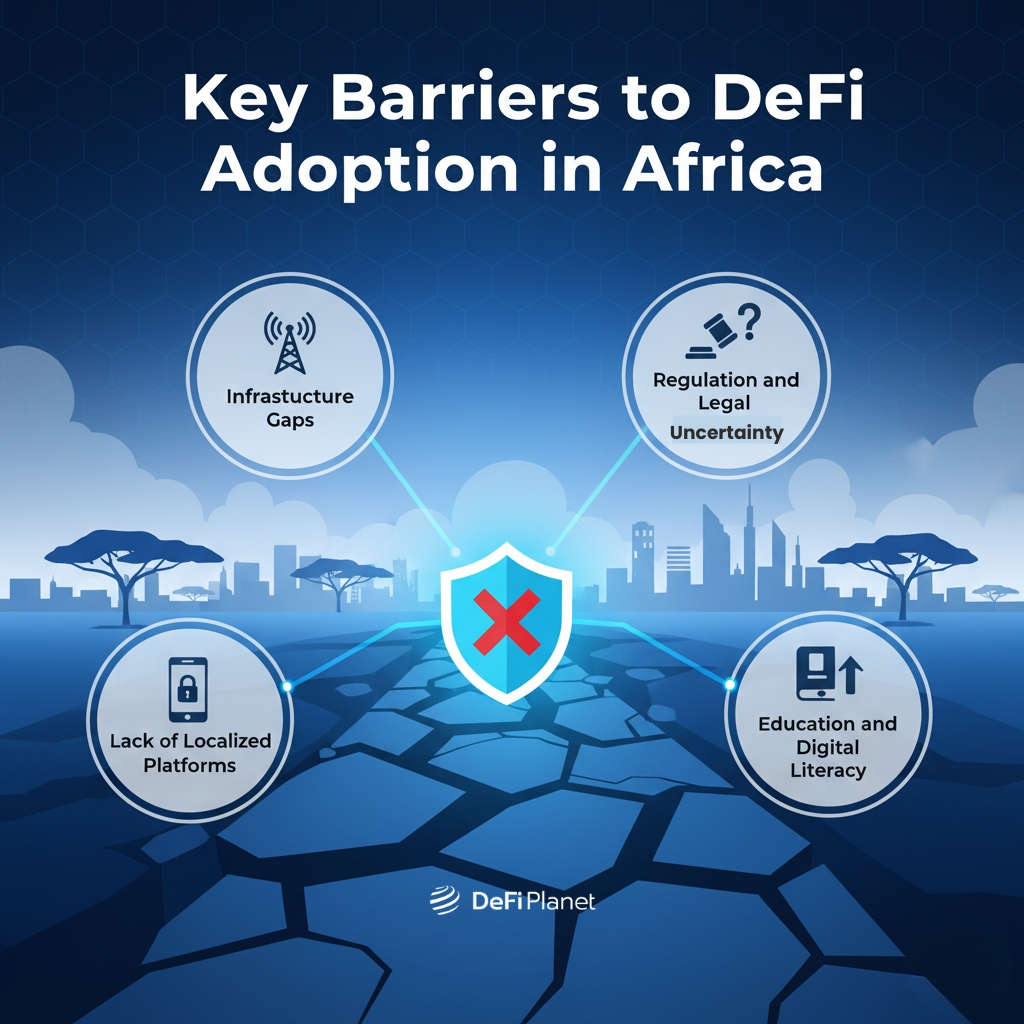
Infrastructure gaps
Access to reliable internet and digital devices is still limited in many parts of Africa, especially in remote and underserved areas. Internet connectivity is often unstable, and many DeFi apps require constant access. In addition, smartphone coverage remains low in some regions, further limiting participation.
Even in areas where devices are available, DeFi apps that require high bandwidth can be costly due to expensive data rates. On top of that, frequent power outages and limited access to affordable electricity in some African countries remain major barriers to widespread crypto adoption in Africa.
Regulation and legal uncertainty
The absence of concrete legal frameworks is one of the issues discouraging the use of DeFi in Africa. Some governments are fearful or hostile towards crypto adoption in Africa. For example, in Kenya and Zimbabwe, central banks recently issued warnings against the use of cryptos, and in Nigeria, banks were temporarily banned from using them.
This uncertainty discourages developers from building, scares away investors, and creates fear among users who worry about legal consequences or having their funds blocked.
Lack of localized platforms
Most existing DeFi protocols are designed for users in the Global North. They typically have English-only interfaces, lack support for local African currencies, and offer poor integration with popular mobile money systems like M-Pesa or MTN Mobile Money.
As a result, users face several UX challenges, from difficulties converting fiat to crypto to navigating DeFi without customized onboarding experiences tailored to the African context. The lack of local fiat on- and off-ramps and region-specific tools makes DeFi difficult to access and use effectively.
Education and digital literacy
Even though the adoption of cryptocurrency and awareness are growing among Africa’s young population, DeFi still feels technical and intimidating to many. Users often struggle with complex concepts like liquidity provision, yield farming, and wallet seed phrases.
Widespread distrust in speculative finance, fueled by a history of scams and rug pulls, has further damaged confidence in DeFi platforms. The gap between DeFi’s promise and real-world usage persists, mainly because there’s no large-scale digital literacy initiative or trusted local influencers helping people understand the risks and benefits in simple terms.
READ ALSO: Is Africa Quietly Becoming the Real Testbed For Blockchain’s Future?
The Road to Closing the DeFi Gap
The potential of DeFi in Africa can only be unlocked when the builders, regulators, and communities build systems that best fit the local realities rather than import/copy models.
Build for Africa, not just in Africa
Many DeFi platforms are still designed with Western audiences in mind. Instead, developers should focus on building for African users, offering interfaces in local languages, mobile-friendly UX, and apps that use minimal data.
The approach must be mobile-first. Not everyone owns a smartphone, so compatibility with feature phones or even SMS-based DeFi services could help expand access.
By connecting stablecoin services with mobile money platforms like M-Pesa, Airtel Money, or MoMo Pay, millions of Africans could access DeFi without relying on centralized exchanges.
Regulatory collaboration and sandboxes
Instead of pushing DeFi into legal gray areas, African countries could collaborate with innovators through regulatory sandboxes, controlled environments that allow for the safe testing of blockchain technologies. Kenya, South Africa, and Ghana are already exploring more progressive frameworks.
However, broader progress will require regional cooperation. Organizations like the African Union could play a vital role in developing cross-border standards that balance innovation with effective financial oversight.
Education as infrastructure
No amount of technology matters if users don’t know how to operate it safely. That’s why education should be treated as essential infrastructure. DeFi must be simplified into culturally relatable pieces, using local languages and storytelling through community-driven efforts.
Broader awareness can be achieved through collaboration with NGOs, schools, fintech startups, and trusted local influencers. Practical skills for the next generation of African DeFi users and builders can be developed through DeFi bootcamps and financial literacy hubs.
Building trust through community-led protocols
Trust is a major currency in Africa, and a community-based model could help bridge the gap between traditional finance and DeFi. For example, DAOs and protocols that mimic familiar trust-based systems, like village savings groups (ROSCAs or SUSUs), can bring established trust mechanisms into the digital space.
Transparent smart contracts, lending pools managed by the community, and verifiable audits will also create confidence. Also, local validator networks can keep governance close to the people most affected by the outcomes.
ALSO READ: Which African Country is Poised to Lead the Crypto Revolution?
Who’s Leading the Charge? African Builders to Watch
Despite infrastructure and regulatory issues, more African startups and international partners are laying the groundwork to bring DeFi in Africa into a prosperous, self-sustaining state that serves the continent’s needs.
Yellow Card
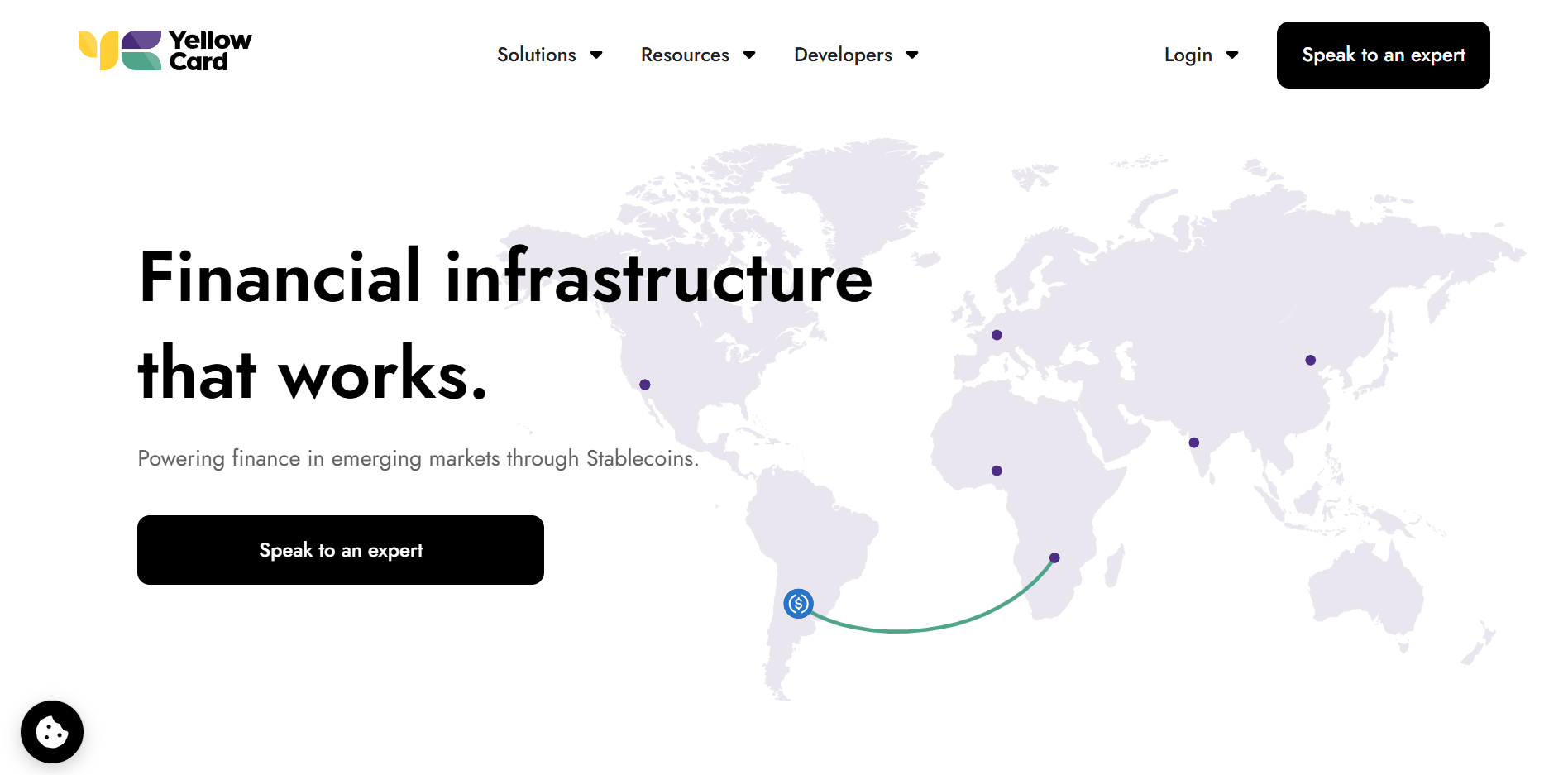
Yellow Card is one of the largest cryptocurrency exchanges in Africa, operating in over 20 countries. It allows users to access digital assets using local fiat currencies, bank transfers, and mobile money systems.
The platform emphasizes compliance and user education, making it a secure gateway for relatively new crypto users in Africa. They are also exploring stablecoin infrastructure to make the adoption of cryptocurrency and cross-border payments seamless.
Fonbnk
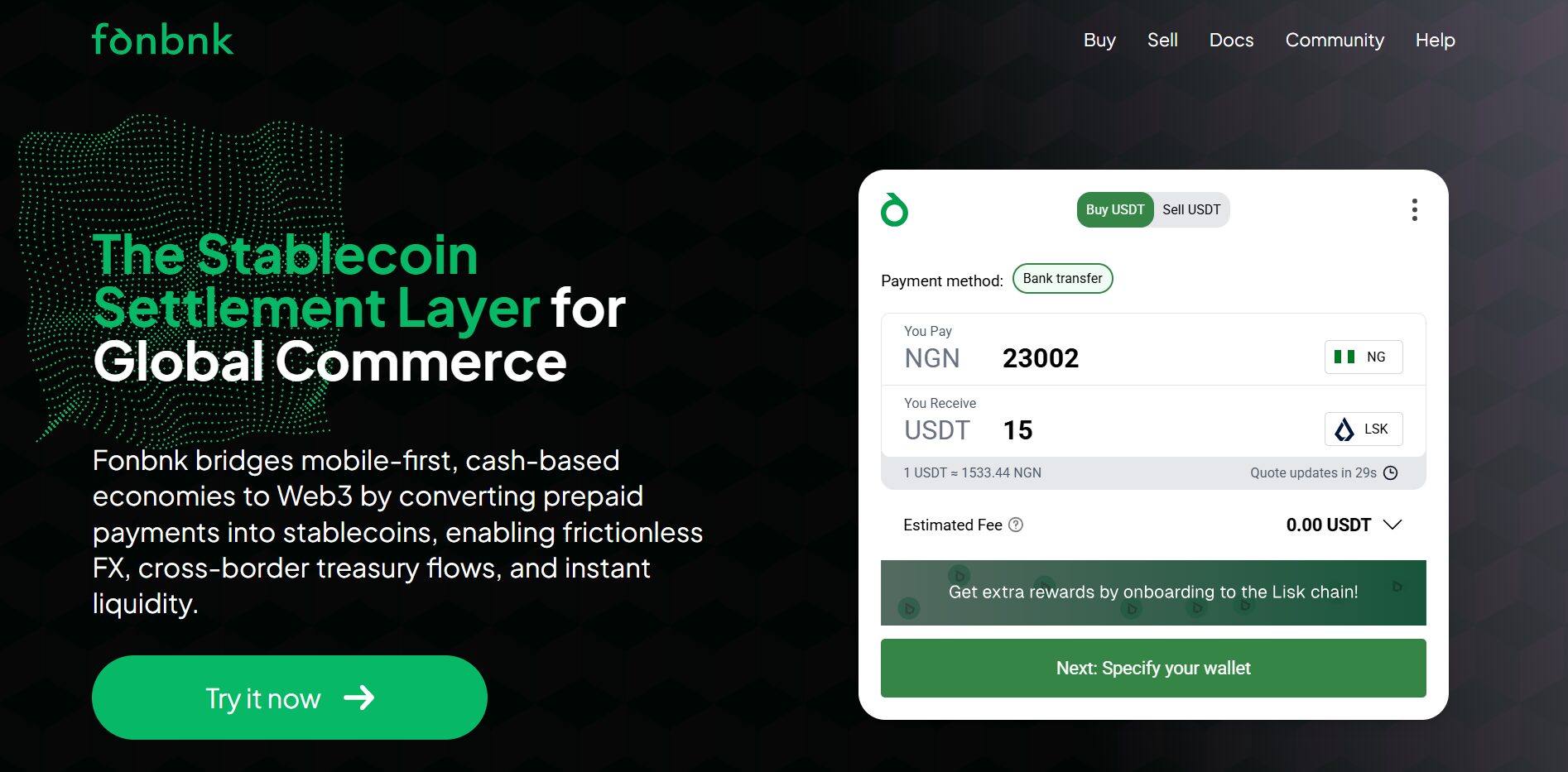
Fonbnk allows users to convert mobile airtime into cryptocurrency, effectively turning prepaid phone minutes into digital money. This innovation is especially useful in countries where prepaid airtime is more common than traditional bank accounts. By tokenizing mobile credits, Fonbnk opens the door to DeFi access for people without bank accounts.
Kotani Pay
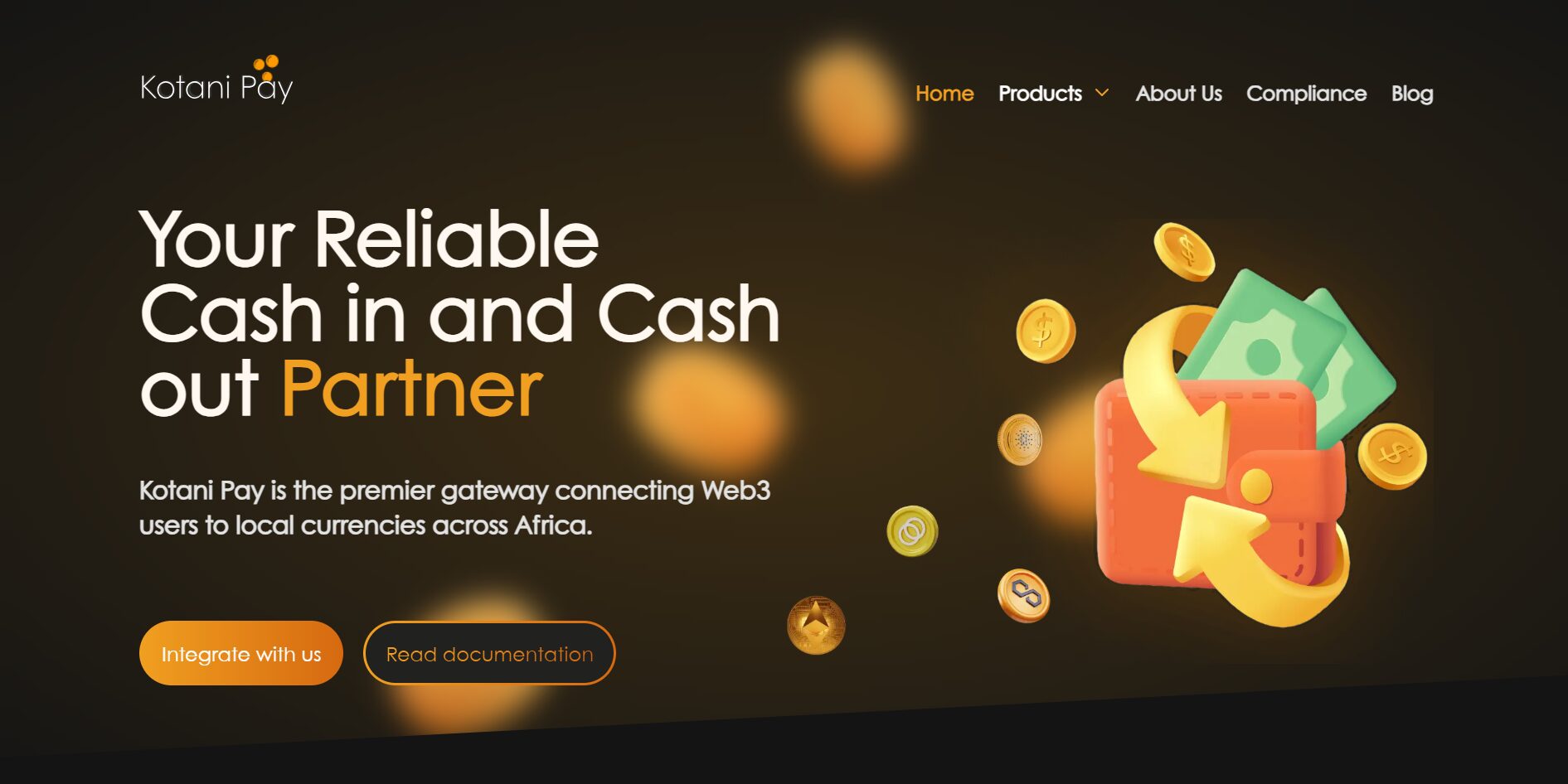
Kotani Pay connects blockchain technology with mobile money, allowing users to access crypto via USSD, even without a smartphone or internet connection. This makes DeFi and blockchain services accessible to millions of people in rural areas.
The company works with charities and DAOs to deliver aid via stablecoins, which are sent directly to local mobile wallets. It serves as a strong example of how DeFi can be scaled to promote financial inclusion.
Mara

With Coinbase Ventures and Alameda Research at the helm, Mara is building a crypto stack in Africa, including schools and infrastructure. Users download the Mara Wallet to purchase and store digital assets. Also, the Mara Foundation supports developers by nurturing local talent in Web3 and DeFi.
Global Protocols Making Local Inroads
Several global blockchain platforms are also engaging directly with African communities:
- Celo: With its mobile-first design and partnerships like the Alliance for Prosperity, Celo has focused on launching pilots in Kenya and Uganda for peer-to-peer payments and microloans.
- Near Protocol: NEAR’s Africa Regional Hub supports local developers, educational programs, and community-led DeFi projects with grants and technical resources.
- Cardano (Input Output Global): Cardano has invested in educational partnerships and blockchain ID solutions in Ethiopia, focusing on government-level adoption and long-term infrastructure.
Africa’s DeFi Moment Is Coming, But Won’t Be Automatic
The unique financial environment and the dire need for decentralized and inclusive financial instruments are why Africa could become a world leader in decentralized finance. With more than 350 million unbanked adults, high mobile money adoption, and increasing interest in the adoption of cryptocurrency, the elements are already here.
Yet talent is not sufficient. To succeed in continental DeFi, creators need to stop following the West’s example. They must devise platforms that will take into consideration the realities of Africa, including poor access to the internet, regulatory inconsistencies, a fragmented financial system, and unequal levels of digital literacy.
Africa’s DeFi future won’t be imported; it will have to be invented. Provided that the ecosystem is focused on the principle of localization, regulatory collaboration, and the empowerment of users, it could leap ahead and redefine what truly inclusive finance looks like in the Web3 era.
Disclaimer: This article is intended solely for informational purposes and should not be considered trading or investment advice. Nothing herein should be construed as financial, legal, or tax advice. Trading or investing in cryptocurrencies carries a considerable risk of financial loss. Always conduct due diligence.
If you would like to read more articles like this, visit DeFi Planet and follow us on Twitter, LinkedIn, Facebook, Instagram, and CoinMarketCap Community.
Take control of your crypto portfolio with MARKETS PRO, DeFi Planet’s suite of analytics tools.”
Delegate Your Voting Power to FEED DRep in Cardano Governance.
DRep ID: drep12ukt4ctzmtf6l5rj76cddgf3dvuy0lfz7uky08jfvgr9ugaapz4 | We are driven to register as a DRep by our deep dedication to the Cardano ecosystem and our aspiration to take an active role in its development, ensuring that its progress stays true to the principles of decentralization, security, and community empowerment.DELEGATE VOTING POWER!








